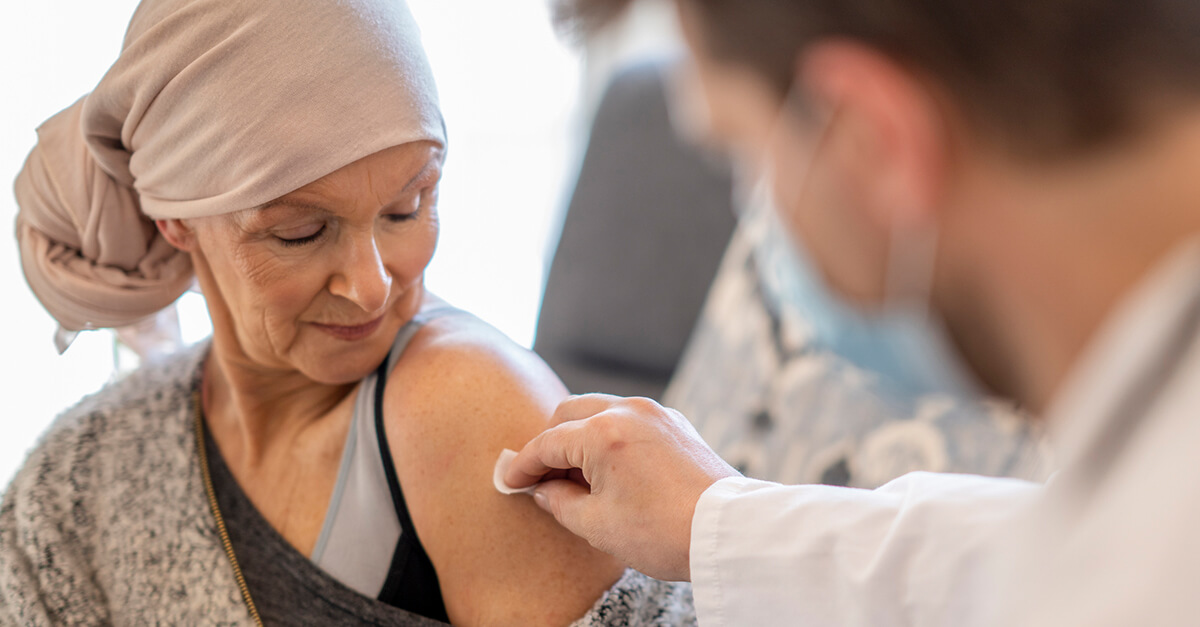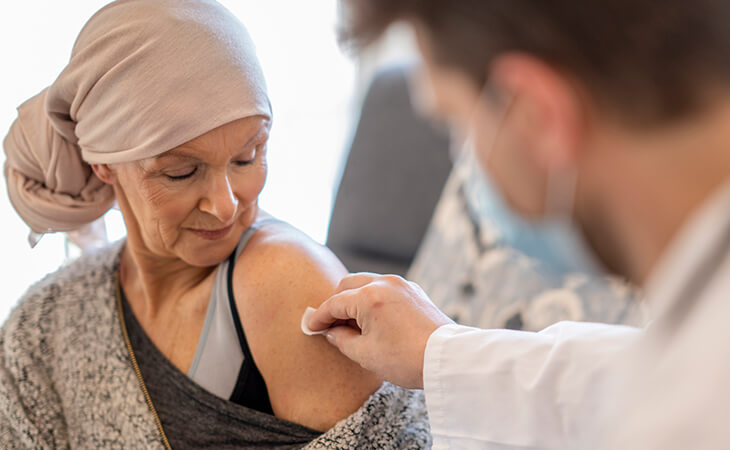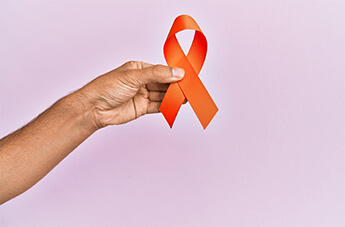Kidney cancer and COVID-19: What you should know


The COVID-19 pandemic has added a new level of concern for people living with kidney cancer and other cancers. Studies suggest that you’re twice as likely to get COVID-19 if you have cancer. Researchers believe this may be due to having a weakened immune system after receiving certain cancer treatments.
Fortunately, COVID-19 vaccines can significantly boost your immune system response to the virus. Research presented at the International Kidney Cancer Symposium in late 2021 found that vaccinated people with renal cell carcinoma (the most common type of kidney cancer) had a 92% immune response rate. Within two months of the first vaccination dose, they had developed sufficient antibodies in their blood to help fight off a COVID-19 infection.
From the community: “I am nearly 65 & 2 years post Nephrectomy due to cancer .I also have high blood pressure, which I take medication for & I have Emphysema.I have self isolated since 16th March as I work in a busy office/reception area & I am extremely anxious about contracting Covid-19. I honestly thought that I would have received a letter advising me to “shield” due to my health conditions but as of today have received nothing. I did have a phone consultation with my GP last week & voiced my concerns however he didn’t seem to think that I was high risk. My GP also said that my recent blood test showed that I am borderline diabetic & have high cholesterol. I have also read a report from medical experts in Italy which says that the corona virus is also attacking the kidneys in a lot of patients. Surely those of us with only 1 kidney should be “shielding”, especially if we also have other health issues. I would welcome any advice.” – Inspire member
Frequently asked questions about COVID-19 when you have kidney cancer
The Centers for Disease Control and Prevention (CDC) and the American Cancer Society (ACS) recommend getting the COVID-19 vaccine if you have cancer, regardless of whether you’re in active treatment or have no evidence of disease (NED). Here’s a look at what else you need to know about living with kidney cancer during the COVID-19 pandemic.
How does COVID-19 affect your kidneys?
Should I stop kidney cancer treatments if I get COVID-19?
Does having one kidney affect your outlook if you get COVID-19?
How does metastatic kidney cancer affect your COVID-19 risk and prognosis?
How can I reduce my risk of COVID-19?
How does COVID-19 affect your kidneys?
Some people who get sick with COVID-19 — regardless of whether they have kidney cancer — experience kidney damage. The European Association of Urology (EAU) found that 1 in 3 hospitalized people with severe COVID-19 symptoms showed signs of decreased kidney function. This kidney damage may be due to low oxygen levels in your blood, blood clots that clog blood vessels to your kidneys, or the virus directly attacking kidney cells.
Should I stop kidney cancer treatments if I get COVID-19?
If you’re actively receiving treatments for kidney cancer and develop COVID-19 symptoms, you should get tested and notify your doctor if the results are positive. Depending on the kidney cancer stage and treatment plan, you may continue treatments. However, people with metastatic kidney cancer (cancer that spreads outside the kidney) may need to temporarily stop treatments like immune checkpoint inhibitors if the virus symptoms are severe. Because these drugs stay in your body for several weeks, pausing treatment for a short period shouldn’t affect your prognosis. And stopping treatments can give your immune system the boost it needs to fight off the virus.
From the community: “All of us, healthy and/or immunocompromised, should be using every precaution not to contract COVID-19 and not to be an unwitting carrier of the disease to anyone else. THere are obviously people who get and spread the disease without any real understanding that they have been ill, or just had such a minor response, sniffles or flu-ish feeling for a few days, that they could not ever be proven to have had COVID-19 without a test… Manage your general health and be very cautious in your behavior--wear a mask, wash hands, no large gatherings--which can be 6-8 people who all can bring additional risk. This will pay off for you and your family and friends!” – Inspire member
Does having one kidney affect your outlook if you get COVID-19?
If you’ve had a nephrectomy to treat kidney cancer, it means you have only one fully functioning kidney. Surgeons sometimes remove all of a cancerous kidney (radical nephrectomy) or just the diseased part of the organ (partial nephrectomy). This surgical treatment doesn’t increase your risk of getting the virus. However, the virus can cause kidney damage, which can be very problematic if you’ve had a nephrectomy. It’s estimated that 1 in 5 people hospitalized in intensive care units (ICUs) with COVID-19 develop kidney failure that requires dialysis.
How does metastatic kidney cancer affect your COVID-19 risk and prognosis?
Treatments for metastatic kidney cancer like immunotherapy, targeted therapy, and chemotherapy can weaken your immune system. A weak immune system can affect your ability to fight off the virus and recover from symptoms. It can be especially dangerous to get COVID-19 if kidney cancer spreads to your lungs (lung metastases). COVID-19 is a respiratory illness that affects breathing and oxygen levels. These problems can worsen when you have lung mets.
How can I reduce my risk of getting COVID-19?
Many organizations like the CDC, ACS, and the National Comprehensive Cancer Network (NCCN) strongly recommend vaccinations (including the booster) for anyone with a history of cancer or who is actively getting cancer treatments. But the vaccine isn’t foolproof. You can still get the virus.
Even if your area doesn’t have a mask mandate, you can lower your risk of exposure by continuing to wear masks when out in public. You should also practice social distancing, regularly wash your hands, and use hand sanitizer. To further reduce your risk, sign up for grocery and meal deliveries or curbside pickup. And see about scheduling some of your medical appointments via telehealth, when appropriate.
Sources
COVID-19 vaccines in people with cancer. American Cancer Society. February 2022.
Goodman J. COVID-19 vaccination yields high seroconversion rate in renal cell carcinoma. Cancer Therapy Advisor. November 6, 2021.
Cancer survivors: Staying well during COVID-19. Centers for Disease Control and Prevention. November 2021.
COVID-19: How to protect yourself and others. Centers for Disease Control and Prevention. January 2022.
People with certain medical conditions. Centers for Disease Control and Prevention. December 2021.
FAQs on COVID-19 and kidney cancer. European Association of Urology. February 2022.
Tripathi SC, et al. Renal carcinoma is associated with increased risk of coronavirus infections. Frontiers in Molecular Biosciences. November 2020.
Leiser M. COVID-19 vaccination effective for patients with renal cell carcinoma. Hematology/Oncology. November 10, 2021.
The impact of COVID-19 on the kidney cancer community. International Kidney Cancer Coalition. July 2021.
Ask the experts: Common questions about kidney cancer and COVID-19. Kidney Cancer Association. December 2020.
NCCN COVID-19 vaccination guide for people with cancer. National Comprehensive Cancer Network. September 2021.
Disclaimer
Member comments are lightly edited for length and to remove identifying information but are otherwise reproduced as they appear in the community as part of public posts.
This content is for general informational purposes only and does not necessarily reflect the views and opinions of any organization or individual. The content should not be used as a substitute for professional medical advice, diagnosis, or treatment. Please consult your healthcare provider about any questions you may have regarding a medical condition.



